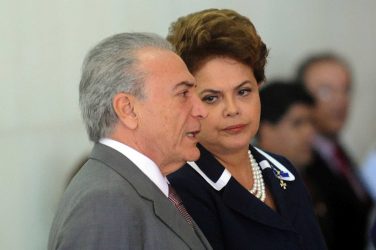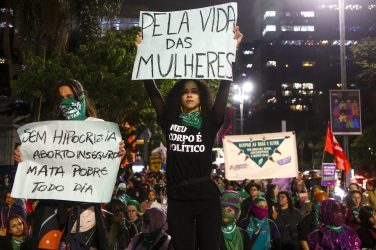 In a move that shocked even the most longtime, jaded observers of corrupt Brasília plotting, the leaders of the House of Deputies, late last night, attempted to sneak into their voting schedule a sleazy bill that would grant themselves amnesty from having violated campaign finance laws.
In a move that shocked even the most longtime, jaded observers of corrupt Brasília plotting, the leaders of the House of Deputies, late last night, attempted to sneak into their voting schedule a sleazy bill that would grant themselves amnesty from having violated campaign finance laws.
This happened with Brazil’s installed president, Michel Temer, out of the country speaking this morning at the U.N. (where he remarkably praised impeachment as a “model” against corruption as he was surrounded by his own corruption-implicated ministers), while the new president of the House, Rodrigo Maia, assumed the position of “interim president” of the republic in Temer’s absence.
Although the plot was thwarted by vehement objections principally led by two relatively small parties (PSOL and Rede) and supported by members from a few others, the attempt itself speaks volumes about the new faction that has seized power in Brazil after impeaching the country’s elected president.
The retroactive amnesty they tried to enact is aimed at so-called “caixa dois”: the covert funds candidates receive and then spend on their campaigns without officially declaring them as expenditures or donations.

Long used by politicians to get massive largesse from large corporations and oligarchs without any detection or legal accountability, this dark practice has been brought to light as part of the country’s sweeping “Lava Jato” corruption investigation.
That’s why these leading members of Congress are now so eager to retroactively immunize themselves from consequences: because so many of the most powerful members of Brazil’s Congress — including the ones who denounced “corruption” as they led the way in impeaching Dilma — are implicated and in serious danger from having broken these laws.
So they’re now trying to pass a new law preventing their own punishment, demonstrating exactly what impeachment opponents have long warned (and Temer’s close ally Romero Jucá admitted while being secretly recorded) was the real goal of removing Dilma: to enable the truly corrupt to use their undemocratically obtained power to protect themselves from investigations and prosecution.
The most important fact to understand about all of this is the list of who is in danger from having engaged in this specific form of campaign corruption.
It includes installed President Temer himself, accused of receiving millions in such funds; his Foreign Minister José Serra, who purportedly received R$ 23 million from the construction giant Odebrecht; the Senate leader of Temer’s government, Aloysio Nunes, accused by two informants of having received such illegal funds; the right-wing senator defeated by Dilma in 2014, Aécio Neves, who is alleged to have received R$ 1 million in illegal funds; and the current Senate President Renan Calheiros of Temer’s party, said to be the biggest recipient with R$ 32 million.
Most important of all on this list is the new House president, Rodrigo Maia, whom the attorney general has placed under formal investigation after he was caught on tape asking the now-imprisoned head of construction giant OAS for R$ 250,000, which was never declared on his campaign forms.
After getting caught on tape, Maia now claims that the funds he received were not for his campaign, but for that of his father — who was just weeks ago removed from his position as city councilman due to his own corruption.
All of those officials implicated in this law-breaking voted in favor of Dilma’s impeachment. That removal dramatically increased their own power as part of the unelected center-right coalition that, despite not being able to win a national election, took over the government once Dilma was gone. To justify their impeachment support, they all gave righteous speeches about the need to combat corruption in politics.
And now, with the power they obtained from that impeachment, they are acting to shield themselves from corruption investigations and the consequences of lawbreaking (notably, key members of PT are also implicated in caixa dois investigations, and the party itself thus appeared on board with this amnesty law even as particular individual members joined the objections).
Perhaps most remarkable about all of this is that they clearly know how slimy and corrupt this was. Journalists attempted — without success — to find out who specifically was responsible for putting this bill on the voting schedule.
This all happened when the third-raking House member, Beto Mansur, was technically in charge (because Temer was out of the country, House President Maia was acting president of the country, and the chamber’s vice president was absent), so that this obscure official would appear to be responsible for all this.
But as the UOL journalist Josias de Souza reported, Mansur, after first pinning it on Maia, thereafter literally refused to say who was responsible for its being placed on the voting calendar, incredibly claiming he “did not know” and — in a hilarious use of the passive tense — would say only that it simply “was put” there.
The corrupt motives at play here are so blatant as to be stunning. As de Souza wrote, “Beyond being invisible, the project is orphaned. There is no trace of the parents of the maneuver. They seem to be ashamed of themselves. And they do not lack reasons.”
PSOL’s leader, Ivan Valente, put it this way as he vowed to stop it: “It’s unbelievable, intolerable, a scandal, a hoax. Soon OAS and Odebrechet are ready to inform [about caixa dois] and you’re going to free dozens of members of Congress and companies” from their guilt?
But this is the real, indescribably corrupt face of the faction that has undemocratically seized power in Brasília, ironically in the name of fighting corruption.
Needless to say, the anti-corruption movement that led the protests against Dilma are, as usual when it involves center-right corruption, nowhere to be found — utterly silent — because they were always motivated by ideology and subverting democracy when demanding impeachment, not fighting corruption.
And one thing is certain: This attempt to protect corruption and further empower the corrupt has suffered only a temporary defeat. This faction — which owes its power to negating rather than working within democracy — has proven itself beyond shame.
Convinced of their own entitlement and ability to act without consequence, there is no doubt they will try again to lavish themselves with amnesty while nobody is looking.
Source/The Intercept/Caribflame









